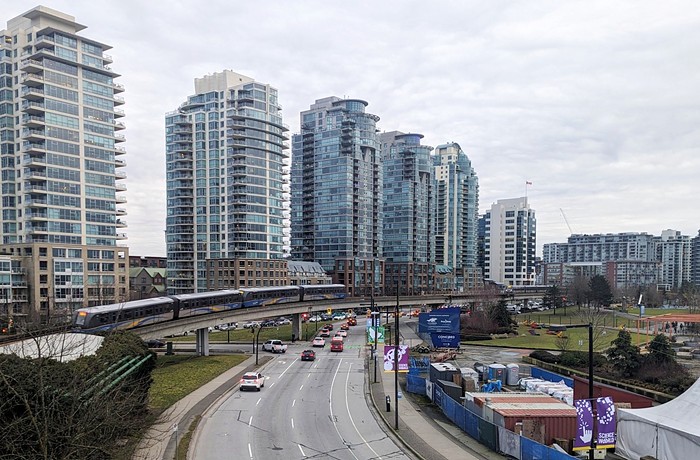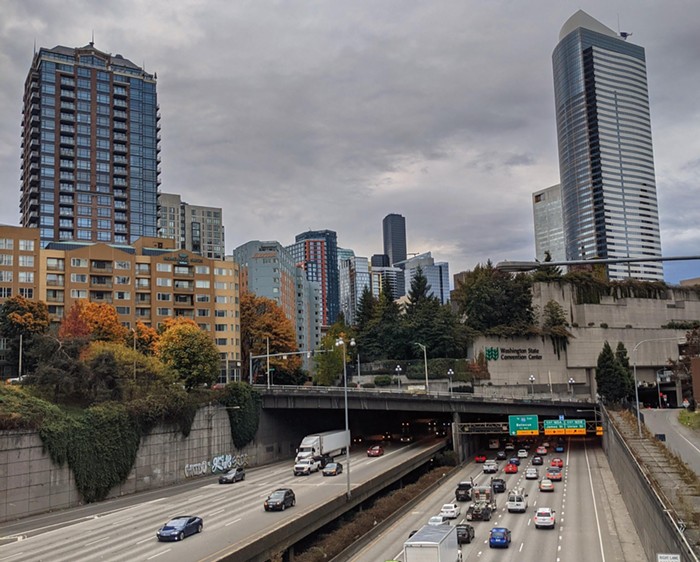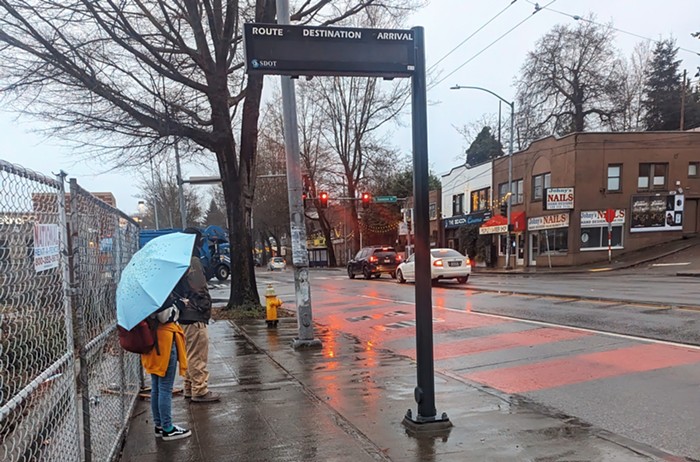On May 23, I received an email letter with the subject "Traffic Congestion." Though the sender claimed to be the standard Seattle liberal type (they live in or near the downtown area), their letter presented an argument that most conservatives and Big Oil would support and even promote without a second thought: Traffic jams cause more global-warming pollution than the smooth flow of automobiles. Therefore, the letter theorized, it makes much more sense to keep cars moving, and this is precisely what the infrastructure for buses and bikes doesn't do: keep cars going and going and going.
A lot of Todds this morning, cruising the bus lane on Aurora Ave. #ViaDoom #Realign99 pic.twitter.com/lVIDl21D09
— Evan Bush (@evanbush) January 23, 2019
From the email:
When they took out a car lane to make room for a bike lane and also added one of those cement bus islands in the street near Mercer, huge traffic backups that never existed before began to occur. A ten-minute commute turned into a 30-minute commute. That’s more idling cars, more green-house gases, and more stressed out drivers. It’s an example of how poor road planning actually created traffic.
The same thing happened on Aurora when they put in the bus-only lanes - but this resulted in over 5-miles of traffic that didn’t exist before. Again, more idling cars = more greenhouse gases, longer commutes, and more stressed out drivers.
Reducing congestion is absolutely KEY to reducing pollution. It’s disheartening to hear the absolutist rhetoric in your article. It’s not an either/or issue.
Dismantling this argument is not only not interesting, but a complete waste of my time. Instead, this post will be about the philosophical function of the automobile. By philosophical, I mean: What kind of subjectivity results from the ownership and operation of a car? Subjectivity refers to what members of the analytic (rather than continental) school of philosophy call "qualia," the internal experience of the real, the outside. This branch of thinking asks: "What is it like to be a bat?" In this post, I ask: "What is it like to be a driver?" But being a bat is an old experience; whereas being a driver is very, very, new indeed. And this difference is of great importance because it shows that the question analytic philosophers were trying to answer was, in essence, a-historical. Meaning, little, in the mode of thinking, distinguishes the consciousness of a bat hanging upside down a million years ago and one doing so today.
As a consequence, the human consciousness of this school of philosophy, which got its start in Austria and the United Kingdom, is outside of history. But the human is not just an ultrasocial animal but, more importantly, a hypercultural one. Ultrasociality can only be a-historical (or, as Moishe Postone puts it: transhistorical). Hyperculturality, on the other hand, opens the door to a form of temporality that is historical. And there are two types of historical time. There is the kind that is described, for example, by one of the most famous figures of ancient Greece, Herodotus—his history had no direction and, as such, was hardly more than storytelling (and this description is identical with the definition of culture in anthropology, which is social learning). The other kind, which is very new (indeed it has only been around for about 400 years), is history with a forward direction: it progresses. This is the feeling of time advancing, improving, becoming more and more technical.
What the second form of history makes very clear is that the qualia of a hypercultural animal is not fixed for all time, but can, under certain conditions, go through rapid changes. The inner world of a human is, in a word, plastic. And more plastic today than it was revealed to be in the time of the historian Herodotus. This is why the consciousness of a human accustomed to a historical moment dominated by horse travel is radically different from that of one dominated and shaped by the automobile. And so one of the key functions of the car is the production of a certain type of subjectivity.
The inner experience of a bat from a million years ago is not that different from those one finds at the dusk of our day. But the consciousness of a person on a horse-drawn wagon is not the same as that of a person commanding a costly wagon powered by fossil fuels (or electricity). And this difference makes a big difference. The inner experience of a driver on, say, Mercer Street is adequate to the way most at the top of their society experience (or feel) reality: as an individual, as above the rest. Without this identification, the feeling that structures the wealthy would receive almost no representation in a functional democracy.
The driver in a traffic jam is, as a consequence, in the worst kind of situation. They have the consciousness/feelings of a person in power, but, in reality, are as powerless as any other commoner. If the present consideration is pressed on phenomena related to the dominant mode of transportation of this time in history, explanations will be easily identified. Road rage, for example, makes little sense if one does not see it as a conflict between feeling and the facts. The mind of a king breaks when it hits the reality of being a mere commoner stuck in traffic.




















